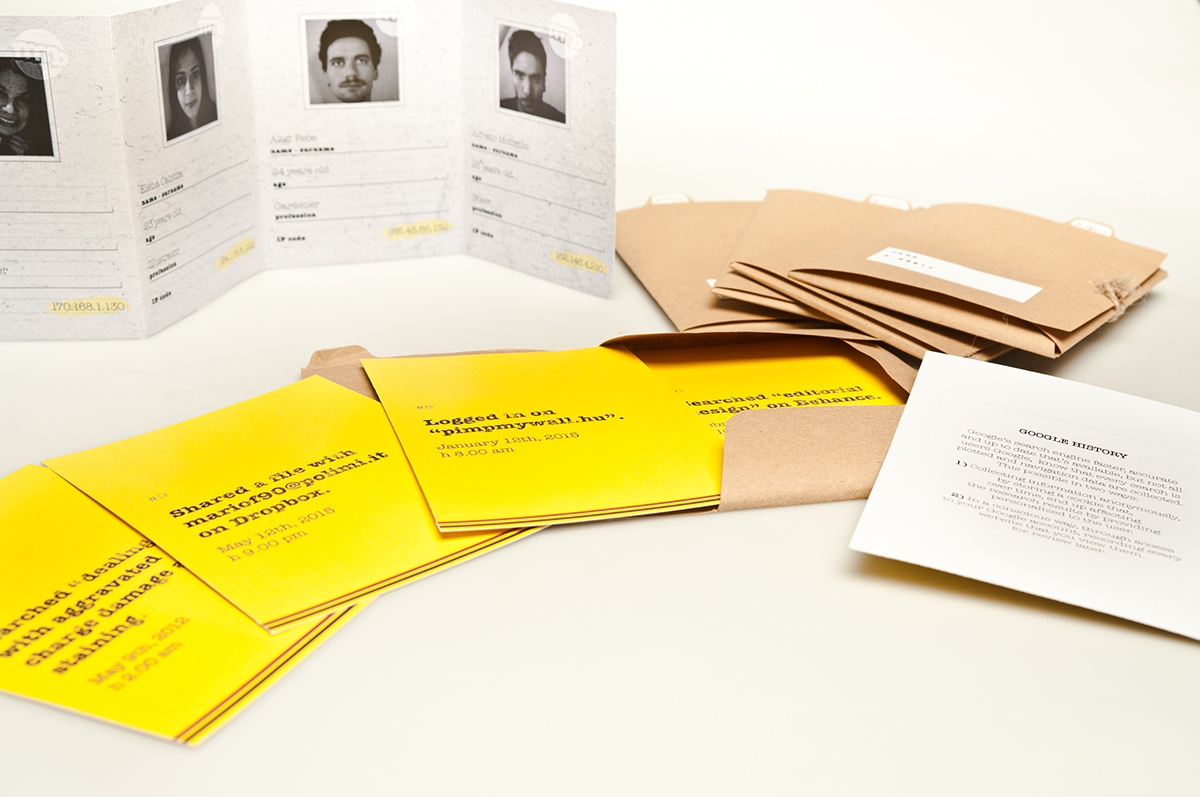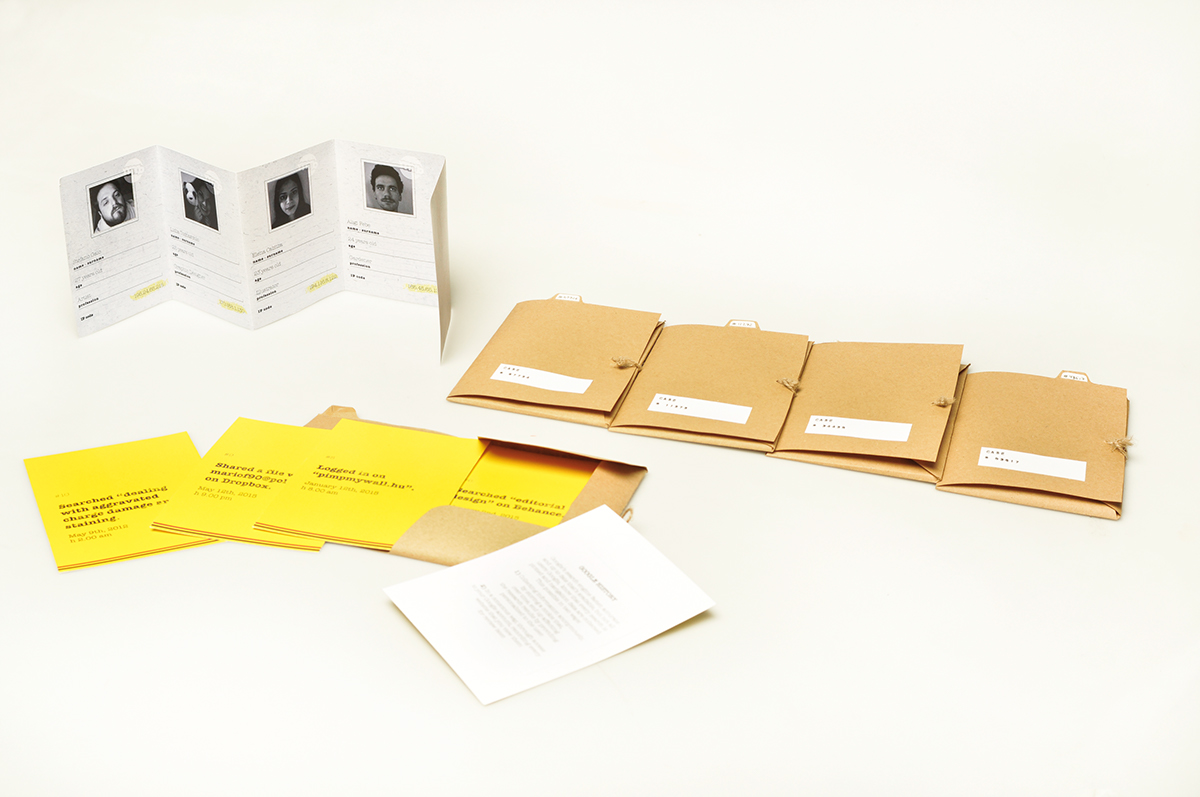
Mind My Business
A game experience about Digital Traces
Introduction
Internet nowadays is one of the primary source for information and most of us connect online everyday. When surfing the internet to research news, or oddities, or items to shop, our informations are kept in a personal timeline. Sometimes we have easy access to these kind of information (as the browser timeline) and we can decide which data we want remove and when. But sometimes we don’t have access to all information about us and they will remain online even if we don’t know anything about them.
To increase awareness about the fact we leave digital traces on the web and create data about everything we do online, during the workshop “My Digital Shadow” at Politecnico di Milano we decided to face this issue creating an artifact which, with irony and no prejudices, will inform users about the persistence of the data on the web, even at a long time distance.
The concept
For our team the best way to involve people in a theme which sometimes they don’t even want to know anything about, is to create a game experience. We designed an artifact consisting in a selection of different kinds of internet surfer’s common contents, to let them know which kind of data can stay and be found by us, or other users, in our timelines. We called our game “Mind My Business” in order to underline how we are involved in first person.
“The game and its practice can include important elements of content and information, which, playing, can be realized and assimilated. A well designed game can generate significative experiences, being capable of sensitize and persuade the players to reconsider some of their thoughts and behaviour. […] The nature of the game itself allow the movement of elements and meaning through the ludic experience.”
(I. Mariani, 2014)

Focus
The theme we worked on is privacy. We focused ourselves on the possibility that things we left as digital traces could give a different idea of us; they could tell aspects we wouldn’t never do or that are connected to what we were years ago. We worked on almost every kind of digital information, particularly on social networks, sharing platforms, searching engines, to create our personal characters for the game. Starting from sources like Facebook, Google History, You Tube, Twitter, Mail, Browsers (Safari, Chrome) and Dropbox, we developed a game experience. Every player should recognize one character out of five, through the clues he left on the web. With this ironic and funny experience, the player can think over the personal internet usage, and be careful about putting informations he doesn’t want to leave online.

Gameplay

In this game, every participant, plays the role of a detective, who should be able to link every clue to the relative character. Characters’ clues come from their digital histories (in the prototype case, we used our personal informations).
The game is composed by a set of five folders containing each one ten clues about one character, which the player must assign to the right character. The pick is based on the characters’ anagraphic informations and pictures showed on a list. On the back of the cards there are hints explaining how internet keep the information relative to the clue’s source. After the player read all the cards of one folder, he can guess who the character is and uncover the picture hidden on the bottom of the folder to reveal the correct character linked to the clues. In this way he can find out if his intuition was right and think about what he knows about that person.
In order to create the character, we found old informations that we didn’t remember about, and some others we wouldn’t even think they were online. In fact, we chose clues we were willing to show, secret informations but not very compromising for us. While we submitted the game to some users, we asked them their opinion about the digital traces, if they knew about them and if the experience made them reflect upon this topic.
Reactions
It was interesting to observe the reaction of the players when asked to put their data on the playground: they would give their personal informations but only in case those are chosen by themselves. The reason why is that every information we put on the web stays permanently, and even simple informations could be object of prejudices, like political, religious, sexual or ideological orientations and personal issues.
For the players the game experience was also an occasion to know better someone and they declared this would be a interesting vehicle also to connect people. This game experience lead to a revaluation on our way to use the internet, and a new awareness about the processing of the personal informations that even if they seem detached and harmless can reveal an accurate identity.
Issues
We thought about creating an extendible version of the game, in which everyone can fill the characters’ clues with theirs or their friends’ informations. The gameplay is simple, but we found out that probably works better with groups of people that already know each other. In fact the testers relied on the informations written on the character’s file, but also on the personal knowledge of the real characters, id est us, the developers. Probably the best way to play at “Mind My Business” is with people that knows a bit of the characters (maybe not too much), where the player can discover some random facts about their friends, and have a laugh on their secret tastes.

"Mind My Business" complete playset.
This project was developed for Workshop II "My Digital Shadow".
Created by Elena Cabitza, Aligi Febe, Stefano Gaio, Alfredo Monzillo, Lidia Tomasuolo.
a.a. 2014/15 Politecnico di Milano


